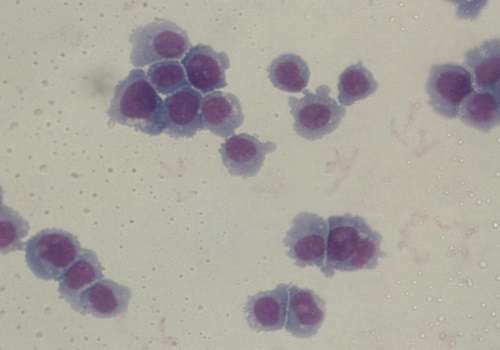Dr. Weeks’ Comment: Now drugs are targeting cancer STEM cells even in the case of leukemia. The revolution in cancer care – Corrective Cancer Care – is dawning! The remedy is anti-inflammatory seeds – eat the seed!
Antibodies directed against cancer stem cells could help patients with acute myeloid leukemia
September 23, 2016

An antibody drug that targets a surface marker on cancer stem cells could offer a promising new therapeutic approach for treating acute myeloid leukemia (AML), a form of blood cancer that affects an estimated 50,000 people in Saudi Arabia.
The leukemia stem cells responsible for propagating the disease express a protein on their surface called CD44. Antibodies that block CD44 have been shown to trigger the stem cells to mature, leading to a reduction in the growth and proliferation of these stubbornly hard-to-treat cells. But it wasn’t clear how or why this happens.
Jasmeen Merzaban and her colleagues from King Abdullah University of Science and Technology (KAUST), Saudi Arabia, studied the signaling pathways that change through treatment with a CD44-directed antibody. Working with both human AML cell lines and a mouse model, the researchers showed that inhibiting CD44 with the antibody led to a decrease in the expression of two central pathways implicated in the aberrant growth of cancer cells: the PI3K (phosphoinositide 3-kinase) and the mTOR (mammalian target of rapamycin) pathways.
Notably, the antibody blocked both of the structurally distinct complexes that include mTOR. That’s important because a complete shutdown of mTOR signaling is probably needed to disrupt the multiple feedback loops that can fuel cancer growth, and drugs that only inhibit one of these complexes have in the past, failed to demonstrate a therapeutic benefit for patients with AML.
“A growing body of evidence suggests that a broader inhibitor would result in a more potent therapeutic effect,” said Merzaban.
An anti-CD44 drug like the one tested by Merzaban might just be that broad inhibitor. Encouragingly, in her team’s hands it doesn’t seem to have toxicity issues.
“We show that the anti-CD44 antibody used for our studies had no effect on normal blood cells,” said Samah Gadhoum, a research scientist in Merzaban’s lab group at KAUST and the first author of the study. “However, more work is needed to carefully determine the effect of these antibodies on other cells and other cellular functions within the body.”
Merzaban, Gadhoum and their colleagues are now running follow-up experiments. For now, though, all their results “support the use of anti-CD44 antibodies for the treatment of AML as a differentiation-inducing therapy,” said Merzaban.
As an added bonus: Unlike other therapies that seem to work only for certain forms of the disease, “the interesting thing about CD44-antibody treatment is that it is able to induce differentiation of many more AML subtypes,” said Merzaban.
![]() Explore further: Monoclonal antibody targets, kills leukemia cells
Explore further: Monoclonal antibody targets, kills leukemia cells
More information: S Z Gadhoum et al. Anti-CD44 antibodies inhibit both mTORC1 and mTORC2: a new rationale supporting CD44-induced AML differentiation therapy, Leukemia (2016). DOI: 10.1038/leu.2016.221

